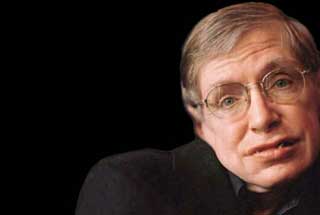20 February 2014
Even Stephen is hawking his science differently
Posted by mcadams

Stephen Hawking demonstrated recently how the traditional process of sharing research results is changing when he uploaded a paper about black holes to the web. Photo credit: NASA.
CHICAGO – Last month, Stephen Hawking uploaded a two-page commentary about his new ideas about black holes to arXiv, a preprint server hosted by Cornell University Library covering research in physics, mathematics, computer science, nonlinear sciences, quantitative biology and statistics.
The paper generated buzz among journalists, who reported on Hawking’s commentary, and it also took off on social media and in the blogosphere where others in the scientific community commented on, discussed and contested Hawking’s ideas.
What Hawking did — posting his thoughts to the site rather than going through the traditional channels — and the commentary that ensued would not have been possible a decade ago, Carl Zimmer, a columnist with The New York Times, told an audience here Feb.13 at the annual meeting of the American Association for the Advancement of Science (AAAS).
The traditional process of how scientists disseminate their research and how journalists report on new scientific findings is changing, and journalists and scientists need to change with it, said Zimmer during a communications session on engaging with journalists.
Scientists used to routinely submit their papers to peer-reviewed scientific journals, and news media then reported to the public about those papers on a specific date when the news embargo was lifted – a one-track method of dissemination, Zimmer noted.
Today, more scientific research is showing up on sites like arXiv months before it shows up in a peer-reviewed journal. Discussions and commentary around scientific findings are also changing as a result.
“Every part of that process now has changed, and it is important for scientists and journalists to be aware how much that has changed,” Zimmer said.
Journalists are now able to find out about research much earlier and in a different way than before. They are able to get a much more realistic idea of how the findings are being received in the scientific community, Zimmer said. But, it also means scientists with the most active Twitter accounts, and not necessarily the most expertise, could end up getting the most attention, he added.
Zimmer said journalists have to develop new standards about how they treat both the papers published directly to the web and the commentary around them. Even a noted science writer like Zimmer is still figuring out what those standards are.
“But Stephen Hawking, in recent weeks, has made clear to me that I have to find some,” he said.
– Nanci Bompey, AGU Public Information Specialist – Writer










 The Plainspoken Scientist is the science communication blog of AGU’s Sharing Science program. With this blog, we wish to showcase creative and effective science communication via multiple mediums and modes.
The Plainspoken Scientist is the science communication blog of AGU’s Sharing Science program. With this blog, we wish to showcase creative and effective science communication via multiple mediums and modes.